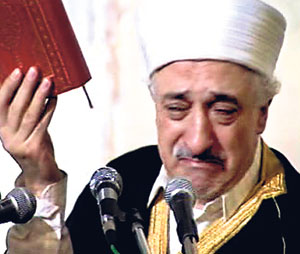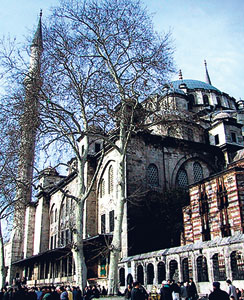Young couples smooching in public, midnight discos, belly-shaking scantily-dressed female dancers, mini skirts, tight jeans and alcohol remind a visitor to the Turkish capital Ankara that he is not in a conservative Muslim country. Though the call for prayer five times a day blares from the loudspeakers of Ankara's grand mosque, the general impression is that Islam, the religion of 99 percent of the Turkish people, is not standing as tall as the 88-metre minarets of the mosque, which is one of the largest in the world.
In the marketplace of Ankara, searching for Islam appears to be a task tougher than finding a needle in a haystack, though a few women in head scarves remind a visitor that Muslims also live in Turkey, which for more than six hundred years had been the standard bearer of the Islamic caliphate till it lost its Islamic identity in political coups and schemes engineered by the West and the Zionists during the late 19th and early 20th centuries.
 |
| Mr. Gulen breaking down while delivering a sermon |
Why is Ankara like a liberal western city, in contrast to Istanbul, my first port of call during a week-long visit to this historic country, courtesy the Cihan News Agency? My Turkish friend tells me that it is because Ankara is the spring of secularism. It is from here that secularism flowed to other parts of the country. It is virtually a secularist colony. To find Islam, one has to penetrate the wall the secularists have built preventing Islam from coming into public life.
"You know, during Prophet Muhammad's time, Arabia was like the present day Turkey. The good and the evil existed side by side. But eventually good triumphed over evil. This will happen in Turkey soon," my friend, a practising Muslim, said.
Elsewhere in Ankara, on June 25, the first day of the Islamic month of Rajab, at a guesthouse run by members of the Fethullah Gulen movement, more than one hundred fasting men gathered in a big hall waiting for the call for prayer at dusk. After breaking their fast, they prayed Maghrib (the Muslim prayer at dusk) and listened to the recitation of Quran by a senior member before they held a meeting. At the end of the meeting, they played a DVD on a big white screen. It showed a man in turban and black robe over his western suit giving a sermon from a mosque pulpit. During the sermon he broke down and wept. So did the congregation. It is this man, Fethullah Gulen who is bringing Islam back to Turkey's secular society. He says he is no opponent of the secular system. He believes Islam can co-exist with secularism, Islam is compatible with democracy and Islam is complementary to modernity. He condemns terrorism and advocates peace through patience and dialogue. For Mr. Gulen, modernity does not mean blind adoption of everything west. His interpretation of modernity comes with respect for human life, decent behaviour, human values and personal integrity.
According to Turkish academics Bulent Aras and Omer Caha, Mr. Gulen seeks to construct a Turkish-style Islam, rekindle the Ottoman glory, Islamize Turkish nationalism, recreate a legitimate link between the state and religion, and emphasize democracy and tolerance. So some call him a modern Ottoman.
Secularism entered Turkey and entrenched itself largely as a result of two factors - one internal and the other external. The internal factor emerged during the early 20th century in the form of pressure exerted by the Young Turks led by pro-Western elites who were riding high then because of a series of humiliation the Ottoman Empire had suffered in wars with Russia and other European powers. They believed Islam was the cause of many ills that befell the empire. The external factor was conditions imposed by the victors of World War I. The July 24, 1923 Lausanne Treaty -- which Turkey was forced to negotiate to retain at least a truncated part of the vast Ottoman territory -- required the republic's first government to take measures to protect minority rights. In other words, this treaty ended the special place Islam enjoyed in Turkey during the Ottoman period and even briefly after its collapse. Mustafa Kemal Ataturk, the founder of the Turkish Republic introduced a series of laws banishing Islam from public life.
Eighty-six years of secularism may have protected the minorities, who form a mere one percent of the Turkish population or less than that, but the policy has done more harm to Muslims. Even today, Muslim women do not have the right to wear head scarves to schools, both public and private, or to any government office. Girl students removing their headscarves at the gates of universities are a common sight in Turkey. Last year, the Islamic-rooted government led by the AK (Justice and Development) Party passed legislation to permit the headscarf in universities and public offices. The law was approved by President Abdullah Gul, who was one time the foreign minister of the AKP government of Prime Minister Recep Tayyip Erdogan. But the secularists took the matter before the Constitutional Court which held the law unconstitutional.
If Ankara is the fort of secularism, Istanbul appears to be the door to Islam's return. It is here, we saw mosques brimming over with the faithful. Men and women attend prayers at Sultanahmet (Blue) mosque, Sultan Fatih and Sulemaniyeh mosques. The crowd was unbelievably large at the Abu Ayub al-Ansari mosque - a mosque that houses the tomb of the companion who shared his house with the prophet when he came to Medina as a refugee. In this city of mosques, more mosques are being built. Turkey has some 85,000 mosques. Headscarf-clad women, young and old, are rampant at shopping malls. People seem to be fast discovering Islam - albeit a Turkish version, a moderate version.
The Gulen movement's stamp is visible in the rise of Islam. Mr. Gulen, some say is a Sufi, a mystic. But he denies he is one, though his teachings have incorporated the fundamentals of Sufism, which is a form of Islam based on extreme love for God and all his creatures. Some say he has founded a new tariqah, a new Sufi order, but he denies this also, though it is no secret he has been influenced by the works of Bediuzzaman Said Nursi, a religious scholar who resisted Ataturk's moves to confine Islam to mosques and spent much of his life in jail. The Bediuzzaman, a title which means 'wonder of the time', authored the Risale-i Nur Collection, a 6,000-page commentary on Quran. Although he also denied he was a Sufi, he was a great admirer of Mevlana Jalaluddin Rumi. The Bediuzzaman not only studied Islam but also excelled in natural sciences.
 |
| The Sultan Fatih mosque in Istanbul |
Similarly, Mr. Gulen, who now lives in the United States, is well versed in Islamic studies as well as modern philosophies. He was included in the Newsweek magazine's list of the 21st century's top one hundred intellectuals. The irony is that some of his critics from the secular camp say he is a CIA agent.
Born on April 27, 1941, Mr. Gulen has more than five million active followers across Turkey, a country of 76 million people. Among his followers are university students, journalists, professionals and businessmen. They claim they are the modern version of the prophet's companions (Sahabas).
They run schools, universities, hostels, student homes, charity groups, newspapers including Turkey's largest-selling newspaper (Zaman), television stations (both local and foreign) and Islamic banks. Their overseas schools in 140 countries, including Sri Lanka, are open to both Muslim and non-Muslim students and Gulen followers say every student is treated equally and every belief system given equal prominence.
These activities are winning the Gulen movement more converts but the group has become a problem for the secularists, including the military. The secularists and top generals in the military believe they are the guardians of Turkey's secular system and regard every Islamist as an enemy of the secular state. But very little have the secularists gathered in the form of evidence to ban the Gulen movement, though Mr. Gulen had been charged with sedition in the past.
However, last month, a newspaper published an alleged military document which gave details of a plan to discredit the Gulen movement and the AK Party. The plan envisaged planting of bombs and explosives in AK party offices and Gulen movement hostels and setting the stage for a military takeover and the banning of the Gulen movement.
Critics say the Gulen movement members and Islamists, especially the AKP supporters, are quietly infiltrating the military and the courts, two institutions dominated by the secularists, with the intention of turning Turkey into an Islamic state one day. They say Mr. Gulen's message of tolerance and forgiveness is only skin deep beyond which lies a grandiose scheme of Islamisation.
|


